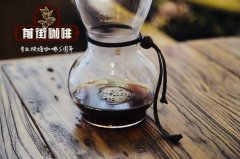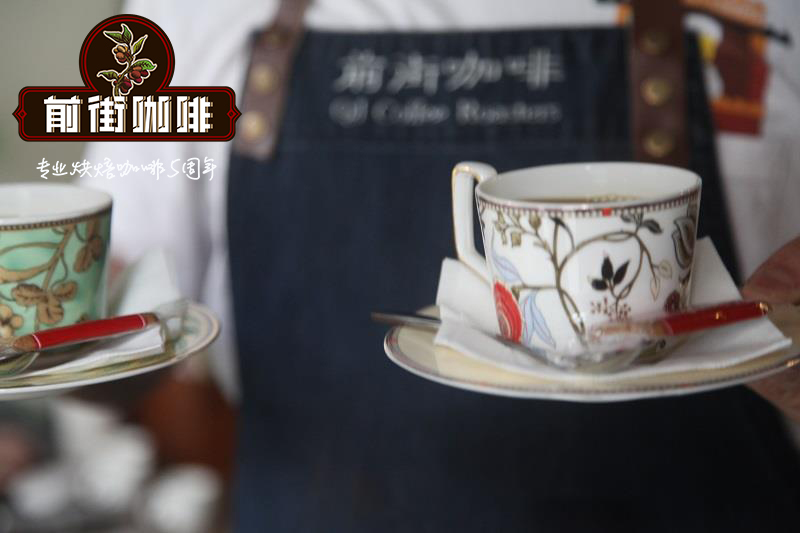Question and answer of Yunnan Xiaogui Coffee | Why do I question Q-Grader? Yunnan raw bean competition

Professional coffee knowledge exchange more coffee bean information please follow the coffee workshop (Wechat official account cafe_style)
The day before yesterday, our coffee workshop posted a headline. After BaiQ evaluated the Yunnan raw bean competition, we would like to re-learn fine coffee. Thank you for your comments. Next, we will answer questions raised by several enthusiastic fans:
@ chen
| I want to tell the editor that each of our participating beans has a record of variety, altitude, picking month and processing method. As long as you change the processing method, you can improve the quality, which is what you said! All the farmers in Yunnan know that this is impossible. It is impossible to change the variety and it will get better! There are too many factors that we all understand, so we strive to improve them in all aspects. Q sell Katim, which you can't understand? Do you have the same mentality when your child tries to get from 60 to 80 in the exam?
A: there is no distinction between varieties in the published results, and a large number of beans are around 85. If the publishers think that varieties are important, should they distinguish between Katim and traditional boutique varieties such as Tibika and Bourbon? Confuse the two and appear on the same report card, so I question this practice. Concealing the information about the altitude of the varieties, but deliberately promoting the treatment method, will only mislead the farmers. I'm not worried about Q selling Katim, but I'm worried that they won't sell after they've scored.
GeekCoffee Coffee Lab:
| after all, it's a good thing to start selling Yunnan beans. It's better to have a conscience than to score 85 points and turn around and buy only imported beans.
A: yes, listen to his words and observe his deeds, so let's see if he is consistent with his words and deeds, use his own scores to endorse the quality, buy all the beans, and then vigorously promote them to your customers.
@ rainbow
| does the editor who once fried a cup of Rose Summer 1000 think it's worth it? Is that the real boutique coffee? No matter how much coffee is, in the end, it is still a cup of drink, so can't China produce boutique coffee? Even Robusta has boutiques. If your mind can't keep up with the times, go and judge it later (if you can drink it). Don't just sit in front of the computer and pat your head and write such subjective words. Whether you write this post for the sake of heat or complaining, you should be responsible for every word you write! The development of everything takes time, please give your country's coffee industry some time! Even foreigners have high expectations for Yunnan coffee, but it is ironic for our own people to complain here.
A: Rose summer is not worth it, but it is recognized as a boutique coffee. Of course, China can have boutique coffee, but it will not mean that a deer is a horse. This is not the right thing to do. "even Robusta has boutiques." Please give an example of which Robusta exists as boutique coffee in most stores. Directly upgrading the raw materials already used for instant coffee to high-quality coffee, I think it is a mistake to the country and the people, and it will also deal a blow to the enthusiasm of people who really grow high-quality coffee.
@ Jerry
| in my opinion, the cup test score is beneficial for publicity and promotion, and has led farmers to improve their cultivation techniques. At least let the world know that Yunnan coffee is not bad and is making progress. But on the market side, the consumer side, the score does not make any sense, flavor and performance-to-price ratio is the decisive factor. If Yunnan wants to build its brand and competitiveness, it can either write about the ratio of performance to price, or it is unique in flavor.
A: according to the Caucasian way of life, is the descendant of the yellow race yellow or white? What are your so-called cultivation techniques? if you plant all the plants, you can only change the way you fertilize and weed, and change the way you harvest. Can only be understood as, Katim produced a better flavor, or Katim in essence.
@ Yan Junhao
| what? The coffee world still has the heat to rub against each other.
A: you didn't ask any real questions, so you came, too? In my opinion, any argument can help the development of the industry, not just one voice.
@ zombieFaust
| first, let farmers start with harvesting and treatment. Only with immediate quality improvement and price increase will farmers have the motivation and confidence to become high-quality products. After all, replanting requires long-term investment. Of course, YCE should also disclose all the information about winning beans.
A: Yunnan is not short of coffee, with a stock of 20-3 million mu. If we directly describe these as boutique coffee in this way, it will only be in vain. It will not really encourage the cultivation and exploration of boutique coffee, and there will never be Chinese boutique coffee. I think there are three elements of boutique coffee, variety, altitude, and treatment. The logic is to determine the recognized varieties, have a good high-quality environment, and then adjust the treatment, and then there will be other innovations. Once the order is changed, Vietnam can also tell you that we are also a producer of boutique coffee, but the goods are still the same. Isn't that a joke?
@ Boiler burner
| it was originally a word. I didn't want to say it. Finally, I decided to say a few words. I am one of the judges of this raw bean competition. I don't know what the editor is trying to say, questioning all the judges? Or contempt for Yunnan coffee? Relatively speaking, Yunnan used to discredit itself, but now they are working hard to improve it. We will find that the quality of Yunnan beans is improving year by year. Of course, this is mainly due to the improvement of the processing technology of raw beans. For those who have not tested beans this year, I think they still have less bia words. Next, let's talk about varieties. There are a lot of things involved. If you want to promote a variety in an all-round way, it doesn't mean that I can just get some seeds and plant them on the mountain. First of all, it was put on record by the Bureau of Agriculture, after numerous experiments, cultivation, screening, and so on. Finally, you can take out something similar to a license to promote planting. This process will take about ten years. Let's talk about this score again. First of all, I think the score of 85 + is really not a high score. I think the upper limit of Kadim is as high as 86. Of course, it depends on the producing area and the variety, isn't it? for beans with the same score of 86, can Asia be compared with Africa? Finally, Yunnan coffee still has a long way to go. You may not like it, but please don't laugh at it.
A: I'm not laughing at Yunnan Coffee, I'm just questioning Q's approach. Because you are a judge, you should have professional knowledge of the producing area, but it seems that you do not.
First, Yunnan coffee did not have a bad reputation in the past. I do not know why you say so. The problem of Yunnan coffee has always been used as a raw material for export for foreign exchange, which is called unified goods in the industry, and the unified price can not be sold. This is no problem, because when planting, the starting point is not to grow boutique coffee, but to have a high output. The current practice is to stink Yunnan coffee, so much of the instant raw materials originally sold to Nestle and sold to Europe are rated as boutique coffee. Even raw material enterprises like Hougu know that Katim and the old variety (Tiebika) buy separately and subsidize fertilizer for the old variety, but it would be better for you to catch the eyebrow and beard and bring the two together to tell the story. Is this how the boutique comes into being?
Second, the quality of Yunnan beans is improving year by year, does it refer to the score of Q? So, is Yunnan coffee selling better and better? I don't know where you can see that your tree has gone down and grown for three to four years, and the cup test will show good results in two years at the earliest. You told me that it has improved year by year, but it is just the trees planted when the price of Katim was good in the first few years. Have you done anything for boutique coffee? most of it is due to changes in Katim's fertilization and treatment methods. Is the technical improvement in botany like this? It is from the selection of the site, the selection of varieties has to start. Trees or those trees, the score is getting higher and higher year by year, this is what you call quality improvement? You got to be kidding me.
Third, with regard to varieties, Tibika has always had a variety for the record of the Agricultural Bureau, which is what we call the old variety, that is, the source of the name of Yunnan small-grain coffee. Katim is a small medium-grain hybrid. There are two reasons why Ka Nong doesn't go back to grow old varieties, one is easy to get sick, and the other is low yield. Tiebika manages only about 100 kilograms per mu of land, while Katim has 330 trees per mu, with a yield of about 400 kilograms. The research direction of Yunnan coffee is to increase the output of coffee, which is based on the consideration of raw material output. That's why boutique coffee is expensive-if you want a good flavor, you have to cultivate it better, pay more attention to the growing environment, and it's naturally more expensive. Good things are certainly worth doing, but directly treating Katim as boutique coffee is, I think, a real harm to people who grow boutique coffee, compromising to the interests of most people in this lazy way, thus hurting a small number of people who really grow boutique coffee varieties.
The Yunnan provincial government has also been promoting boutique coffee in recent years. Each county supports three boutique coffee farms. They clearly know how much boutique coffee is, but as professionals, you mislead them that Yunnan is full of boutique coffee. Do not explore the real direction, I think this will become the wrong direction of China's boutique coffee industry. Mangshi Thermal Research Institute has a stock of hundreds of varieties, the introduction of varieties is not a real problem at all, whether the industry does practical work is the problem.
As a gentleman of the interest side, he introduced varieties from Yega a few years ago, and according to time, there will be some output this year, but I find it a bit regrettable to guide Ka Nong and Yunnan coffee in this way.
@ Ke Xiaoyi
| Katim can't be a boutique coffee because of the low altitude. There are many other factors for becoming boutique coffee, okay?
A: Katim, please give me a fair example. there are but not many traditional high-quality coffee in Arabica, such as the iron card species-Hawaii KONA. Another reason is the near-equatorial marine climate, except that there seems to be no more examples. The hybrid like Katim listed as a boutique is Manning, which contains hybrids such as TimTim, which is an important reason why Mantenin doesn't stand out for boutique coffee. There are many factors for fine coffee, but the basic factors are the variety, altitude, treatment, and the regional flavor formed by the local soil.
When we were in the store, when we talked about the reasons for the production of boutique coffee, we would say: variety, altitude, handling method. But as soon as we get to the origin, we don't even care what kind of coffee it is. Ka Nong said, "you see, we have mountains and water ecology here, and what we grow is good coffee." Q-Grader was so moved that he wiped away tears and scored 86 points on the raw materials originally sold to Nestle. You see, this is where I found the good coffee. My view is that after optimization, Katim, as a commercial bean (70-79), can perform well in matching, but it takes a long time without paying attention to the variety, altitude and treatment to find that it is a high-quality coffee bean (more than 80 points).
Sensory reading
Welcome to discuss ~
Important Notice :
前街咖啡 FrontStreet Coffee has moved to new addredd:
FrontStreet Coffee Address: 315,Donghua East Road,GuangZhou
Tel:020 38364473
- Prev

Ichiro Kanaguchi, the world's oldest coffee worker, died unmarried for a good cup of coffee.
Professional coffee knowledge exchange more coffee bean information please follow the coffee workshop (Wechat official account cafe_style) Japanese coffee industry legend, founder of Cafe deLAmbre (Amber Coffee), Mr. Ichiro Kawaguchi died on March 14, 2018 local time. Ichiro Kanaguchi, born in 1914, graduated from the Engineering Department of Waseda University. Ichiro Kawaguchi was in charge after World War II.
- Next

China's coffee consumption surges Coffee now gets 60 million yuan A round financing, cutting into hundreds of billions of markets
Professional coffee knowledge exchange more coffee bean information please follow the coffee workshop (Wechat official account cafe_style) 2017 coffee bean purchase price-since the introduction of the prices of coffee from various countries into China, consumers' demand for coffee has shifted from the initial consumer demand to social demand. Some institutions predict that the size of China's coffee market is expected to reach 300 billion yuan in 2020 and may exceed 1 yuan by 2025.
Related
- Can lightly roasted coffee beans be used to extract espresso? How finely should you grind high-quality coffee beans to make Italian latte?
- What is the difference between the world's top rose summer coffee and Yejia Shefi? What are the flavor characteristics of Yega Shefi coffee and Panama rose summer?
- The ceremony is full! Starbucks starts to cut the ribbon at a complimentary coffee station?!
- A whole Michelin meal?! Lucky launches the new "Small Butter Apple Crispy Latte"
- Three tips for adjusting espresso on rainy days! Quickly find the right water temperature, powder, and grinding ratio for espresso!
- How much hot water does it take to brew hanging ear coffee? How does it taste best? Can hot water from the water dispenser be used to make ear drip coffee?
- What grade does Jamaica Blue Mountain No. 1 coffee belong to and how to drink it better? What is the highest grade of Blue Mountain coffee for coffee aristocrats?
- What are the flavor characteristics of the world-famous coffee Blue Mountain No. 1 Golden Mantelin? What are the characteristics of deep-roasted bitter coffee?
- Can I make coffee a second time in an Italian hand-brewed mocha pot? Why can't coffee be brewed several times like tea leaves?
- Hand-brewed coffee flows with a knife and a tornado. How to brew it? What is the proportion of grinding water and water temperature divided into?

